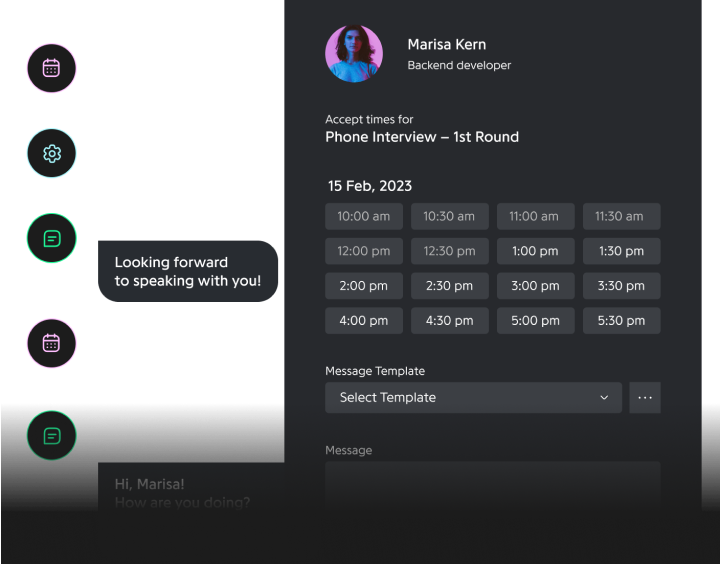Platform
Resources
Save time and effort sourcing top tech talent
Secure your dream tech role
.png?width=225&height=223&name=Hero%20image%20(1).png)
In this bustling and ever-evolving age of data and digital transformation, top tech talent has never been more desirable. But with a generation of tech-native university graduates filtering into the workforce, you’d struggle to find an employee who isn’t tech-literate.
To hire tech talent that sets you apart and allows you to grow, innovate and compete in a market that refuses to sit still, you need to find the flowers amongst the weeds. That’s where a platform such as hackajob comes into its own. But before we explore how we can help you find your next superstar, let’s look at the essential tech roles and some of our favourite strategies for hiring tech talent.
There’s a vast spectrum of tech roles to consider and not all of them will be compatible with your business and its specific needs. Understanding the nuances of each tech role can help you not only better define your hiring needs but also ensure you find the best talent for your projects.
A front end developer brings your brand to life online, transforming all the code and infrastructure developed by the back end team into an interactive, seamless experience for the user. Beyond creating interfaces and making them more kinetic and visually engaging, they ensure the website or app is responsive across devices and browsers. Front end developers are adept at understanding user behaviour and are experts at incorporating that understanding into their designs.

The individuals building and maintaining the backbone of any web application, back end developers handle all the "behind-the-scenes" functionality. Their code is what creates the foundations the frontend needs to operate and ensures that everything from database queries to server responses can function seamlessly.

This role often encompasses several responsibilities. From creating standalone applications to integrating complex software systems, they're the architects of your digital infrastructure and will be tasked with using their computer science knowledge to fulfil the wants and needs of consumers. They do this by testing, debugging, sharing ideas, and collaborating with tech talent in adjacent areas.

In the age of big data, data scientists are the specialists harnessing vast datasets to draw distinct actionable insights. Their work exists to guide business developments and strategies by analysing information. With AI now a major part of our lives and automated data analytics becoming more commonplace, data scientists are going to be even more valuable to the average workforce in the coming years.

Beyond just coordinating development, product managers are the visionaries guiding the entire lifecycle of a product from conception to iteration. They make key decisions regarding which features to add or revise and conduct market research and beta tests to come to reinforce their choices.

Ultimately, a product's success often hinges on the user experience. UX designers need to be able to empathise with users and use that empathy to improve the functionality and experience of all frontend applications. This can be more direct work, using coding tools like Java, HTML and CSS, or more indirect design work.

Arguably the unsung heroes of the tech world, project managers ensure that projects stay on track by mediating between departments and keeping everyone on the same page at the same time. Their end goal is to ensure deliverables meet the set standards and are delivered on time, but they are also notorious plate spinners, often with a hundred tasks on the go at once.

In recent years, it has become increasingly intense for companies in the talent market as they attempt to attract top tech talent. Given the sheer volume of tech jobs and the impact this has on the size of the job pool, it seems as though this trend will continue for years to come.
With the increasingly competitive nature of the tech hiring landscape, understanding how to attract the best talent is crucial and that can be a complicated and expensive process.
It’s not just about hiring the candidate with the right qualification for the right price either. It’s a nuanced process which takes multiple factors into account, from whether you’re looking for remote or in-house staff to whether you require full-time or freelance workers.
Money talk can make even the most seasoned recruitment worker shudder, so transparency is always key when discussing salary. Present a salary range that sets clear expectations, ensures the right candidates apply with the right expectations and showcases your company's willingness to reward talent fairly. When trying to net the best talent, this can make all the difference.
Avoid generic job descriptions like the plague and try to bring the role to life on the page with as much information as possible. A clear and detailed job requirement not only attracts the right candidates but also cultivates a culture of trust and respect. It also helps deter applicants who might not be suitable for the job.
In the tech world, intangible benefits can be just as enticing a hook as a strong salary, particularly when everyone is offering around the same amount. Consider offering extra benefits such as flexible working hours, remote work opportunities, or even mental health days. The happier the talent, the more of themselves they’ll give to the role.
Always be open about the tools and technologies you employ as you want to attract talent that’s already familiar with them. Whether it's the latest in cloud computing or a niche programming language, showcase your tech stack and it can act as a magnet for top tech talent.

hackajob isn't just another recruitment platform; it's a tech talent magnet. Its AI-driven approach matches candidates based on skills, ensuring you get applicants who align with your requirements.
What sets hackajob apart:
Precision matching: Rather than sifting through thousands of CVs looking for the one that fits the bill, you’ll receive a shortlist of candidates tailored specifically to your needs.
Direct communications: Say goodbye to intermediaries. Engage in direct, meaningful conversations with potential hires.
Skill-based AI vetting: Trust in a process that prioritises skill and competence over keywords. We use a combination of AI and human curation to assess the past projects or coding skills of our users and match them directly with you.
Actionable insights: With smart analytics at your fingertips, refine your hiring strategies for better outcomes continually.
"With hackajob, we're able to hire in technologies that are quite difficult to come across. We’ve been one of the most successful companies on hackajob having saved over £350,000 on agencies fees by using hackajob.”